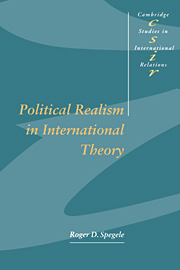2 - Positivist-empiricism and international relations
from Part 1
Published online by Cambridge University Press: 30 October 2009
Summary
The force of illusion reaches its zenith here …
NietzscheIntroduction
Chapter 1 indicated in a general way what positivist-empiricism consists of. The purpose of this chapter is to tease out some of positivist-empiricism's core assumptions and presuppositions, and in particular its assumptions about theory and practice, keeping in mind that this is to be done not from some putative position of neutral observation but from within the perspective of a certain revisionary form of political realism. Of particular concern from this point of view is how positivist-empiricism intends to cope with the challenge of scepticism to which, it is claimed, commitment to assumptions and presuppositions deeply embedded in its understanding of theory give rise. Attention will also be given to the positivist-empiricist's conception of practice and the understanding of the self with which it is bound up. Such an understanding is erroneous: it captures neither our common intuitions nor our moral perceptions.
Theory and practice
Positivist-empiricism: general considerations
Let me illustrate how the three conceptions relate theory to practice by offering Figure 2.1. Positivist-empiricism, emancipatory international theory and political realism are here depicted as articulating different understandings of theory, practice and their relation. To avoid later misunderstanding, it needs to be pointed out that the distinctions depicted in Figure 2.1 are not meant to be neat delineations: the boundaries are intended to be fuzzy and their identifying features are supposed to interweave and overlap. Their value lies in showing that certain partially concealed connections between past philosophical thought and some on-going current research programmes in international relations may be uncovered and made perspicuous. Let us consider Figure 2.2.
- Type
- Chapter
- Information
- Political Realism in International Theory , pp. 22 - 50Publisher: Cambridge University PressPrint publication year: 1996



